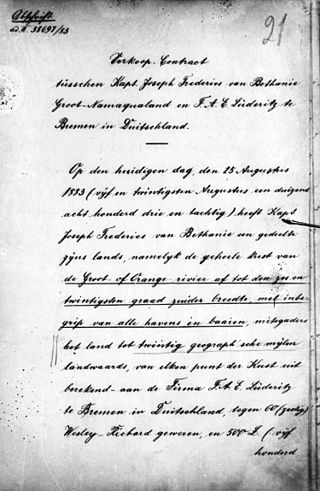Related Research Articles

South West Africa was a territory under South African administration from 1915 to 1990, after which it became modern-day Namibia. It bordered Angola, Botswana, South Africa, and Zambia.

The Griquas are a subgroup of mixed race heterogeneous former Khoe-speaking nations in Southern Africa with a unique origin in the early history of the Dutch Cape Colony. Under apartheid, they were given a special racial classification under the broader category of "Coloured". They are Cape Coloureds who participated in the Great Trek, forming "Griqua States".

Griqualand West is an area of central South Africa with an area of 40,000 km2 that now forms part of the Northern Cape Province. It was inhabited by the Griqua people – a semi-nomadic, Afrikaans-speaking nation of mixed-race origin, who established several states outside the expanding frontier of the Cape Colony. It was also inhabited by the pre-existing Tswana and Khoisan peoples.

The Basters are a Southern African ethnic group descended from Cape Coloureds and Nama of Khoisan origin. Since the second half of the 19th century, the Rehoboth Baster community has been concentrated in central Namibia, in and around the town of Rehoboth. Basters are closely related to Afrikaners, Cape Coloureds, and Griquas of South Africa and Namibia, with whom they share a language and culture. They are also related to the local Nama, with the Rehoboth Basters being considered a Nama clan by many, having a "Kaptein" just like many Nama settlements in Southern Namibia.

Rehoboth is a town in central Namibia just north of the Tropic of Capricorn. Located 90 kilometres south of the Namibian capital Windhoek, Rehoboth lies on a high elevation plateau with several natural hot-water springs. It receives sparse mean annual rainfall of 240 millimetres (9.4 in), although in the 2010/2011 rainy season a record 731 millimetres (28.8 in) were measured. In 2005, it had a population of 21,378 later increased to 28,843 in 2011, according to the 2011 Namibian Population and Housing Census.

Rehoboth was a homeland in South West Africa intended by the apartheid-era government to be a self-governing homeland for the Baster people in the area around the town of Rehoboth.

General Sir Hesperus Andrias van Ryneveld, known as Sir Pierre van Ryneveld, was a South African military commander. He was the founding commander of the South African Air Force.
Johannes Gerard Adolph Diergaardt, more commonly known as Hans Diergaardt was a Namibian politician active for nearly a decade after Namibia gained independence. Prior to that, he was elected as the fifth Kaptein of the then-autonomous Baster community at Rehoboth, succeeding Dr. Ben Africa in 1979 after winning a court challenge to the disputed election of 1976.

Hermanus van Wyk (1835–1905) was the first Kaptein of the Baster community at Rehoboth in South-West Africa, today Namibia. Under his leadership, the mixed-race Basters moved from the Northern Cape to leave white racial discrimination, and migrated into the interior of what is now central Namibia; the first 30 families settled about 1870. They acquired land from local natives and were joined by additional Baster families over the following years. The Baster people developed their own constitution, called the Paternal Laws. They relied on the herding of sheep, goats and cattle as the basis of their economy.

Rietoog is a settlement in the Hardap Region of Namibia. It is situated 112 kilometres (70 mi) southwest of Rehoboth and 130 kilometres (81 mi) north of Maltahöhe along the M47 gravel road. The name Rietoog means Cane-eye, named after a spring that looks like an eye, surrounded by canes, near the town.

Joseph Frederiks II, Nama name: ǃKhorebeb-ǁNaixab was a Captain of the ǃAman, a subtribe of the Orlam. He became Captain when his uncle and stepfather David Christian Frederiks was killed in 1880 in the Battle of Otjikango.
Ben Africa is a Namibian politician, medical doctor, and former Baster captain.
Petrus "Piet" Matheus Junius was a Namibian politician who served as the Deputy Education Minister of the Interim Namibian Government from 1985 to 1989.
John McNab was a Namibian politician who served as Rehoboth Baster captain from 1999 until 2020.

The Rehoboth area, historically the Free Republic of Rehoboth is an unrecognized state in central Namibia, inhabited by the indigenous Baster people.
The Baster Council, is the parliament of the unrecognized state of the Rehoboth area in Namibia. It forms the legislature, or Volksraad, of Rehoboth together with the executive Captains Council (Kapteinsraad).

The Captainsof the Rehoboth Baster were the traditional leaders of the indigenous Baster community in central Namibia, until the dissolution of the Rehoboth Homeland in 1990, upon Namibian independence.
Cornelius van Wyk was the second Captain of the Rehoboth Baster, serving from 1914 until his death in 1924.
David Jacobus "Dap" Izaaks (1932/1933–2005), also known as Oom Dap, was a Namibian Baster politician who served as Acting Captain of the Rehoboth Baster between February 1998 and January 1999. He also served as Mayor of Rehoboth.
The Rehoboth Uprising of 1924-25 was the bloodless revolt of the Rehoboth Baster against the South African Administration in South West Africa. The revolt was caused by diminishing Baster autonomy and territory, as a result of Administration policies.
References
- ↑ Zandberg, Jeroen (2010). Rehoboth Griqua atlas (2nd ed.). [South Africa]: Jeroen Zandberg. ISBN 978-1-4452-7242-9. OCLC 931789146.
- ↑ "BIOGRAPHIES OF NAMIBIAN PERSONALITIESin alphabetical order". www.klausdierks.com. Retrieved 2022-03-18.